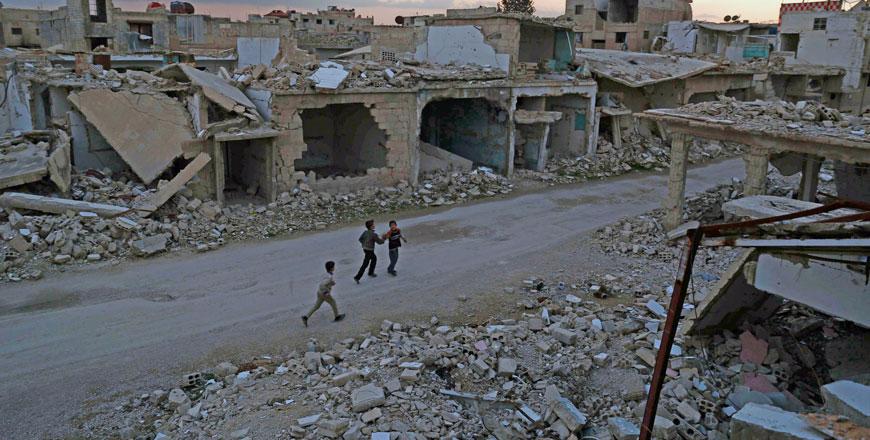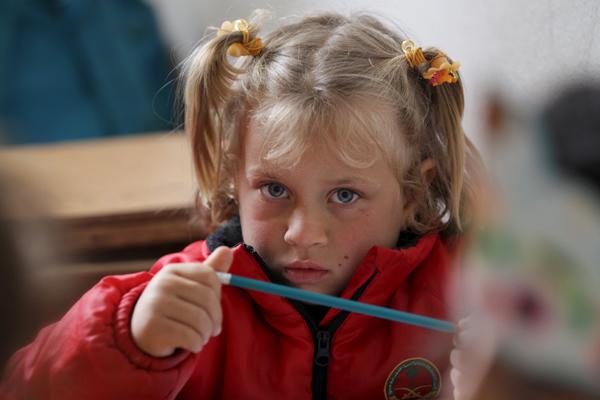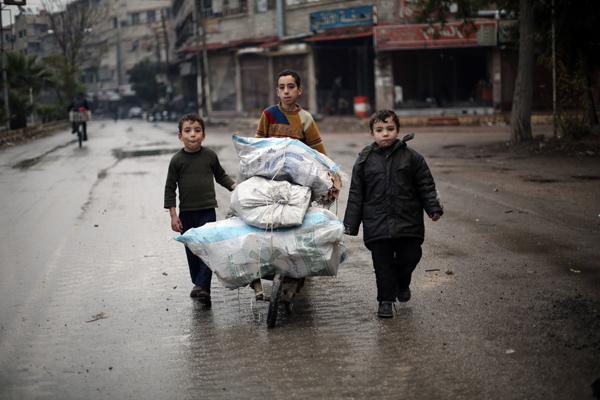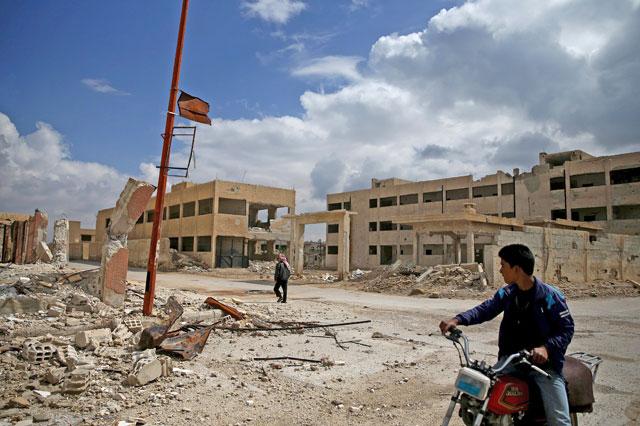You are here
Syrian opposition says gov’t wrecking truce deal
By Reuters - Feb 29,2016 - Last updated at Feb 29,2016

Syrian children walk past heavily damaged buildings in the rebel-held town of Douma, on the eastern edges of the capital Damascus, on Saturday on the first day of the landmark ceasefire agreement (AFP photo)
BEIRUT/GENEVA — A senior official from Syria's main opposition group said on Monday that a fragile international attempt to halt nearly five years of fighting was in danger of total collapse because of attacks by government forces.
The cessation of hostilities drawn up by Washington and Moscow faced "complete nullification" because Syrian government attacks were violating the agreement, the official of the Saudi-backed opposition High Negotiations Committee (HNC) said.
France said there were reports of attacks on opposition forces in breach of the deal, which came into force on Saturday, and countries backing the Syrian peace process met to try to clarify the situation.
UN Secretary General Ban Ki-moon said the pause in the fighting was largely holding, despite some incidents that he hoped would be contained. The Kremlin said the process was under way, although it had always been clear it would not be easy.
The British-based Syrian Observatory for Human Rights said the cessation was largely holding with casualties greatly reduced compared with before the agreement took effect.
The cessation of hostilities, the first of its kind since the war began in 2011, is a less formal arrangement than a ceasefire. It is meant to allow peace talks to resume and aid to reach besieged communities.
Aid trucks carrying non-food items such as blankets on Monday entered Mouadamiya, a suburb of Damascus under siege by government forces, the Syrian Arab Red Crescent said.
The United Nations and other agencies hope to deliver aid to more than 150,000 people in besieged areas over the next five days.
Gloomy assessment
Asaad Al Zoubi, head of the HNC's delegation to the peace talks, gave a gloomy assessment of the truce. "We are not facing a violation of the truce... we are facing a complete nullification," he said on Al Arabiya Al Hadath TV.
“I believe the international community has totally failed in all its experiments, and must take real, practical measures towards the [Syrian] regime,” Zoubi said, without elaborating.
He said there were no signs of any preparations for peace talks, which the UN wants to reconvene on March 7.
Talks in Geneva in early February collapsed before they started, with rebels saying they could not negotiate while they were being bombed.
HNC spokesman Salim Al Muslat said the truce was a step in the right direction, but that there was no means of preventing it being violated.
“There has to be a power that really stops what Russia and what the regime is doing,” Muslat said in a television interview with Reuters in Riyadh. “Today there about 10 Russian air strikes, about 16 air strikes done by the regime.”
He said a mechanism was needed to stop such violations and encourage negotiations.
Syrian officials could not immediately be reached for comment on claims that government forces were violating the cessation. The government, whose forces are backed by Russian air power, has said it is abiding by the agreement.
However, a Syrian foreign ministry official accused Saudi Arabia of trying to undermine the cessation of hostilities agreement by saying there would be a “Plan B” if it failed. He did not give details of the plan, which is believed to include military action.
Russia on Monday also rejected any suggestion of a Plan B, which has been alluded to by US Secretary of State John Kerry.
The agreement does not include extremistgroups, such as Daesh and Al Nusra Front, and Russia has made clear it intends to keep bombing them. But rebels regarded as “moderate” by the West fear they will also be targeted as they operate in areas where Al Nusra Front is also present.
Countries belonging to the “International Syria Support Group”, led by the United States and Russia, met in Geneva on Monday.
They are supposed to monitor compliance with the deal and act rapidly to end any flare-ups.
“We have received indications that attacks, including by air, have been continuing against zones controlled by the moderate opposition,” French Foreign Minister Jean-Marc Ayrault said in Geneva. “All this needs to be verified.”
Air strikes are heavy
The HNC said the cessation of hostilities was broken by the Syrian government 15 times on the first day, and that there were further violations by Russia and Hizbollah, both allies of President Bashar Assad.
On the ground, rebels said the violence was below pre-ceasefire levels in some places and little changed in others.
Colonel Fares Al Bayoush, head of a Free Syrian Army group called the Northern Division, told Reuters: “The air strikes are heavy today, especially by Russian planes.”
Abu Al Baraa Al Hamawi, a fighter with the Ajnad Al Sham group in northwestern Syria, said the government had shelled a number of villages. “It is regular bombardment, no change. The regime after the truce is as it was before.”
A fighter in the Aleppo area said the overall level of violence had gone down, but there were many violations and people were pessimistic.
The Syrian Observatory for Human Rights, which monitors the war through a network of contacts on the ground, said the number of people dying each day had gone down substantially since the cessation started.
“Yesterday, around 20 people died, both fighters and civilians. Before, there was an average of maybe around 180 people a day. It’s a big reduction in terms of human losses,” observatory director Rami Abdulrahman said.
Syrian government forces meanwhile regained control of a road to the northern city of Aleppo after making advances against Daesh militants.
Government forces had been relying on the route to reach Aleppo, which it sees as a major prize.
Daesh militants in northern Syria also came under cross-border artillery fire from Turkey, a military official said.
Russia meanwhile expressed concerned about Turkish military preparations along the border with Syria and said an armed intervention would deal an “irreparable blow” to the ceasefire.
Russian Deputy Foreign Minister Sergei Ryabkov also suggested that Syria could become a federal state if that model worked for the country.
Related Articles
BEIRUT/GENEVA — The Syrian opposition said on Wednesday there had been fewer breaches of a truce agreement by the government and its allies
BEIRUT — The head of the Syrian opposition's negotiating team said on Thursday it was not optimistic about peace talks getting under way in
BEIRUT/GENEVA — Syria's army backed by Russian warplanes launched an assault north of Aleppo on Thursday, threatening to block a vital rebel



















